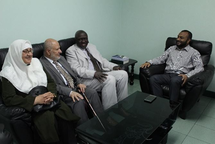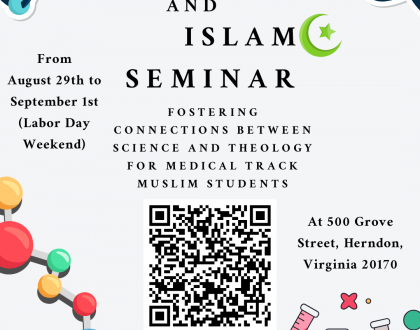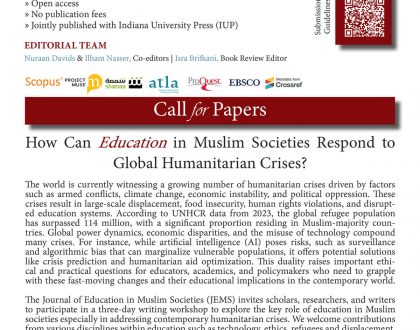Prof. Kasule and Prof. Malkawi Visit University of Maldives

Picture
The CEO of the International Institute of Islamic Thought (IIIT), Professor Omar Kasule and Professor Fathi Hasan Malkawi, the Regional Director of the IIIT arrived in Male’, Maldives on 26th February 2016. The purpose of the trip was to begin the initial discussions about possible avenues of academic and professional collaborations between IUM and IIIT.
Picture
Professor Omar Kasule highlighted that when there are problems, it is wiser to take them positively. He emphasized that the success of IIIT is due to the fact that it was able to overcome many difficulties. He stressed that education is the solution to many problems even though education itself has many challenges. To exemplify this point, he related his own experience of having to internalize two different worldviews; the western and the Islamic. Professor Kasule’s discussion focused on how the establishment of the IIIT has helped to bring a solution to the crisis in education through Islamization. However, he mentioned that the term “Islamization” was difficult to define and problematic, therefore a new term –‘integration’- was coined to replace it. According to him, integration refers to integration of Qur’an and Sunnah with other forms of knowledge.
Professor Kasule mentioned various libraries and resources that IUM may be able to access in order to begin the process of integration of knowledge and also for general reference.
After this initial meeting, Dr. Omar Kasule left. Professor Fathi Hasan Malkawi remained to conduct workshops for both students and the staff of IUM.
Picture
Professor Malkawi’s Workshops and sessions with IUM staff and students
1st Workshop: “Epistemological Integration” (28th February 2016)
Professor Fathi Hasan Malkawi conducted the first workshop for all the staff of IUM on 28th February 2016. The workshops were conducted in two sessions. The workshop “Methodology Of Epistemological Integration” was based on the seven chapters of his latest book “Epistemological Integration: Essentials of an Islamic methodology”. All the sessions were interactive and effectively engaged the staff in discussions and debate along with allocation of various assignments designed to stretch the imagination, to discover and to explore experiences, as well as to reflect on the Quran, Hadith and Sunnah for a thorough understanding of epistemological integration.
The first session focused mainly on exploring the concept of epistemology as the foundation of Islamic methodology. Prof. Malkawi highlighted the importance of integrating sound thinking and a system of values (akhlaq) in making meaning of the system of knowledge or epistemology. The concept of epistemological integration was portrayed as a point of reference for Islamic methodology.
Session 2: “Methodology of Epistemological Integration” (28th February 2016)
The second session, continuing from the first, focused on methodology. In this session, Prof. Malkawi highlighted sources of knowledge that inform methodology of epistemological integration as “the Islamic worldview”, “the original sources” (the Quran and the Sunnah), “legacy of both Muslim scholars and those of non-Muslims” and “reality of the present”. According to Prof. Malkawi, methodology is about forming a certain worldview that involves use of intellect and practical means. Therefore, it is important to integrate intellect, practice and research to Islamic methodology. Prof. Malkawi pointed out that often people have a parallel view of academic disciplines and religious knowledge and regard these two fields as unlikely to meet or integrate. He highlighted the problematic nature of viewing disciplines this way and promoted the view that it is important to think about ways of forming links and integrating the portrayal of disciplines as we now know with that of an Islamic worldview.
2nd Workshop: “Islamization of Knowledge” (29th February 2016)
The second workshop was conducted for the staff of IUM and focused on explaining the notion of Islamisation of Knowledge (IOK). Prof. Malkawi began the discussion by highlighting the historical context that resulted in formulating such an idea. He highlighted the key role of International Institute of Islamic Though (IIIT) in conceptualizing the term, the rationale behind it and the work that was initiated to promote the term and its applications.
The key point highlighted by Professor Malkawi regarding IOK was that it was initiated for the purpose of intellectual reform of Muslim Ummah, to regain the respect and recognition that the Islamic Ummah deserves and this can only be achieved through dissemination of knowledge. Therefore, Islamisation is regaining power through knowledge. He explained that in order to work within the realm and philosophy of Islamisation, it is necessary to be in command of contemporary knowledge; more specifically to have mastery of methodology as it is an integral part of this contemporary knowledge. For this to happen, any university built with the basic philosophy of Islamisation should have a staff with an “integrated personality”; that is, a staff who has mastery of contemporary knowledge and are at the same time informed by an Islamic worldview so that they can fulfill the three fundamental principles of a university (that is; teach, research and contribute) that is designed within the framework of Islamisation as the basis.
Picture
Session with students of IUM – “Priorities of Research in Areas of Civilization” (29th February 2016)
IUM hopes to introduce postgraduate qualifications in June 2016 and research is an important area the university hopes to promote and encourage in both students and the staff. The session “Priorities of Research In Areas Of Civilization” for the students of IUM by Prof. Malkawi was a discussion to sensitize the students on the importance of research for building civilizations and how it is a part of a human being’s everyday life. He highlighted the importance of research in Islam and the need for its application in our own life with references to examples from the Quran. The session was attended by 30 undergraduate and postgraduate students from various disciplines in IUM.
Public Lecture: “Intellectual Building of Muslim Personality” (1st March 2016)
The public lecture “Intellectual Building of Muslim Personality” was the culmination of intellectual and academic activities conducted by Prof. Malkawi. The public lecture was attended by approximately 200 people including the Chancellor of IUM, Dr. Mohamed Zahir Hussein; Vice Chancellor, Dr. Mohamed Shaheem Ali Saeed; senior staff and lecturers of IUM; secondary school students, principals and teachers from various schools in Male’; Hulhumale’ and Vilingili; and students and lecturers from various colleges in Male’. In this Lecture, Prof. Malkawi discussed the need for intellectual reform of the Muslim mind and in general the Muslim Ummah, highlighting that this is integral to regain the recognition and respect that Muslim scholars, philosophers, academics etc. need to be able to fully contribute to building of Islamic Ummah.
Summary
The trip to IUM by Prof. Fathi Hassan Malkawi was very fruitful, especially during this transition period, when IUM is trying to build a new reputation as an Islamic university. IUM takes International Islamic University Malaysia (IIUM) as a model (although we also study universities in other parts of the world) and we recognize the role and the contribution of IIIT in the development of IIUM. We feel that IIIT can assist in the development of IUM and the staff in many ways by:
Training/ workshops
Curriculum development and presentation within the framework of Islamisation and integration
Orienting students to the concept of IOK
Resource sharing and access/library development.
Scholarship opportunities for staff and students in IIIT partner universities.
Facilitation of Exposure trips to IIIT partner universities.
Research (network with IIIT partner universities and scholars).
Assistance in terms of input to programs of community engagement.
The Chancellor, Dr. Mohamed Zahir Hussain; Vice Chancellor, Dr. Mohamed Shaheem Ali Saeed; Deputy Vice Chancellors; Senior Management Staff; Staff and students of IUM would like to thank CEO, IIIT, Prof. Omar Kasule for facilitating this visit.
We would like to extend a special thank you to Professor Fathi Hasan Malkawi for the stimulating sessions and the public lecture he so tirelessly conducted for IUM staff and students and general Maldivian public respectively.
Recommended Posts

Exploring Bioscience & Islam Seminar Series
May 21, 2025

IIIT at AERA 2025 Annual Meeting
April 14, 2025

JEMS – Call for papers
April 11, 2025
